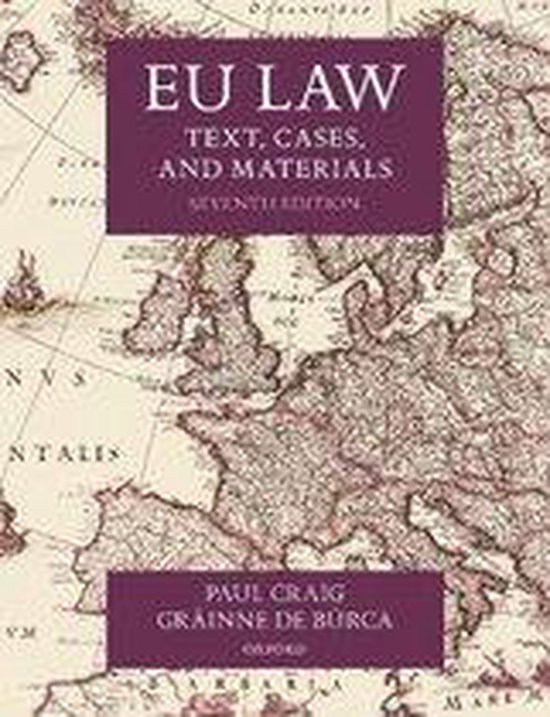Constitutional foundations of the EU:
Lecture topics:
Week 1:
- The evolving European project: from EEC to EU and beyond
- The EU’s Treaty basis
Week 2:
- The institutional framework of the EU
o Introduction to the EU’s institutions
o The council
o The European council
o The European parliament
o The European courts
Week 3:
- Law-making in the EU
o Legislative procedures
o ‘Turf wars’ battles over the correct legal base for EU legislation
o ‘soft law’ and the Open Method of Coordination (OMC)
o Exercising powers; the principles of ‘subsidiarity’
Week 4:
- The EU’s legal order and supremacy
o Supremacy
o Re Kadi
o Re Opinion
o Reception in members states
Week 5:
- Access to and enjoyment of EU law
Week 7:
- The mangold origins
o Post-mangold developments
o How far can ‘Mangold’ go?
o The relevant date at which the duty applies
Week 8:
- State liability in damages to individuals
Week 9:
- Enforcement actions
o Judicial dialogue, Art 267 TFEU references
o Power or obligation to make a reference
o The quality of dialogue under Art 267
Week 10:
- General principles of law
o Fundamental rights
o On the role of the CJ in the development of the protection of the fundamental rights
o Article 51 scope
o Article 52 scope of guaranteed rights
o Revolving (?) the issue of which court is the final arbiter of human rights questions as they
pertain to EU law
Week 11:
- Constitutional aspects of the withdrawal agreement legislation
, Topic Lecture 1 Lecture 2
Intro X X
The institutional framework of the EU X X
Law-making in the EU X X
The EU’s legal order and supremacy X X
Access to and enjoyment of EU law Lecture 7 X Lecture 8 X
The mangold origins Lecture 9 X Lecture 10 MCQ workshop
State liability in damages to Lecture 11 X Lecture 12 X
individuals
Enforcement actions Lecture 13 X Lecture 14
General principles of law Lecture 15 X Lecture 16
Constitutional aspects of the Lecture 17 Lecture 18
withdrawal agreement legislation
Lecture 1:
Module outline:
- Legal evolution
- Competences
- Actors
- Law-making
- Supremacy of EU law
- Direct effect
- Remedies
- Fundamental rights
- Brexit
The saga of departure:
- 1973 accession into the EEC (European Economic Community)
o The European integration was an economic project, not a social or political project as it has
now evolved.
- 1975 first referendum
- Continuous cross-party divisions/anti-scepticism
- Conservative government (David Cameron) European Union Referendum Act 2015
- 2016 referendum
- 51.9% leave/ 48.11% remain
- Not legally binding, but did lead to leaving on 31 January 2020
,Why study EU law (post-Brexit):
- Economic and financial crisis
- The future of the Euro
- Trade agreements and external relations
- Important time for lawyers to understand the contents and implications of EU law given the
decision of the UK to leave the EU
- Migration ‘crisis’, security and terrorism
- EU citizenship and the right to move, reside, work, study, trade, (claim welfare benefits) in any MS.
What about third country nations (TCNs)?
- Human rights protection. Non-discrimination
Evolving economic models:
- Free trade area (no internal border tariffs)
- Customs union (ditto plus common external tariff)
- Common market (ditto plus free movement of goods, labour, services, capital)
- Economic and monetary union (inc. common currency)
- Political Union? Federal State?
Legal evolution: Treaty milestones:
- Treaty of Rome 1957 founded European Economic Community): seeking peace, stability and
economic progress among 6 Member States
- Single European Act 1986 re-launched single market
- Treaty of Maastricht 1992 established EU, renamed EEC as European Community ‘pillar ‘within EU
, The EU’s immediate past (from 1992 TEU): The 3 pillars of the EU:
- Why 3 pillars? A symptom of evolving integration
- EC (first) pillar more integrated in political and legal terms: supranational decision-making, review
by Courts, individual rights, etc.
- 2nd and 3rd pillars more intergovernmental in decision-making processes; greater powers retained
by MSs; less reviewable
- N.B.
- The Lisbon Treaty has now ended the formal pillar divisions
- But Common Foreign and Security Policy (CFSP) still has special rules
- All elements now called ‘EU’ and ‘EU Law’
The treaty of Amsterdam 1997:
- An amending Treaty (i.e., amended the TEU and EC Treaty)
- Some of pillar 3 (Justice and Home Affairs) moved to pillar 1 (EC)
- Stronger anti-discrimination provisions (now Art.19 TFEU)
- Introduced sanction mechanism for violation fundamental rights by a MS (Art. 7 TEU)
- Renumbered the EC Treaty and TEU
Treaty of Nice 2001:
- An amending Treaty
- Dealt with the ‘Amsterdam leftovers’ regarding institutional reforms (with a view to 2004
enlargement), e.g. just 1 Commissioner per MS; more QMV (qualified majority vote rather than
unanimity) in more areas
- Charter of Fundamental Rights was solemnly proclaimed
- A very unhappy compromise!
- Declaration to open a more fundamental and wide-ranging debate on the future of the EU
From Nice to Lisbon:
- Political dispute over direction of the EU
- Social or market directions?
- Unwieldy decision-making structures after 2004 enlargement
- Conflict over constitutionalising the EU
- Draft European Constitution 2004 failed due to national referendums failed
- Agreed by MSs but defeated by French and Dutch referenda in ratification process
Lecture topics:
Week 1:
- The evolving European project: from EEC to EU and beyond
- The EU’s Treaty basis
Week 2:
- The institutional framework of the EU
o Introduction to the EU’s institutions
o The council
o The European council
o The European parliament
o The European courts
Week 3:
- Law-making in the EU
o Legislative procedures
o ‘Turf wars’ battles over the correct legal base for EU legislation
o ‘soft law’ and the Open Method of Coordination (OMC)
o Exercising powers; the principles of ‘subsidiarity’
Week 4:
- The EU’s legal order and supremacy
o Supremacy
o Re Kadi
o Re Opinion
o Reception in members states
Week 5:
- Access to and enjoyment of EU law
Week 7:
- The mangold origins
o Post-mangold developments
o How far can ‘Mangold’ go?
o The relevant date at which the duty applies
Week 8:
- State liability in damages to individuals
Week 9:
- Enforcement actions
o Judicial dialogue, Art 267 TFEU references
o Power or obligation to make a reference
o The quality of dialogue under Art 267
Week 10:
- General principles of law
o Fundamental rights
o On the role of the CJ in the development of the protection of the fundamental rights
o Article 51 scope
o Article 52 scope of guaranteed rights
o Revolving (?) the issue of which court is the final arbiter of human rights questions as they
pertain to EU law
Week 11:
- Constitutional aspects of the withdrawal agreement legislation
, Topic Lecture 1 Lecture 2
Intro X X
The institutional framework of the EU X X
Law-making in the EU X X
The EU’s legal order and supremacy X X
Access to and enjoyment of EU law Lecture 7 X Lecture 8 X
The mangold origins Lecture 9 X Lecture 10 MCQ workshop
State liability in damages to Lecture 11 X Lecture 12 X
individuals
Enforcement actions Lecture 13 X Lecture 14
General principles of law Lecture 15 X Lecture 16
Constitutional aspects of the Lecture 17 Lecture 18
withdrawal agreement legislation
Lecture 1:
Module outline:
- Legal evolution
- Competences
- Actors
- Law-making
- Supremacy of EU law
- Direct effect
- Remedies
- Fundamental rights
- Brexit
The saga of departure:
- 1973 accession into the EEC (European Economic Community)
o The European integration was an economic project, not a social or political project as it has
now evolved.
- 1975 first referendum
- Continuous cross-party divisions/anti-scepticism
- Conservative government (David Cameron) European Union Referendum Act 2015
- 2016 referendum
- 51.9% leave/ 48.11% remain
- Not legally binding, but did lead to leaving on 31 January 2020
,Why study EU law (post-Brexit):
- Economic and financial crisis
- The future of the Euro
- Trade agreements and external relations
- Important time for lawyers to understand the contents and implications of EU law given the
decision of the UK to leave the EU
- Migration ‘crisis’, security and terrorism
- EU citizenship and the right to move, reside, work, study, trade, (claim welfare benefits) in any MS.
What about third country nations (TCNs)?
- Human rights protection. Non-discrimination
Evolving economic models:
- Free trade area (no internal border tariffs)
- Customs union (ditto plus common external tariff)
- Common market (ditto plus free movement of goods, labour, services, capital)
- Economic and monetary union (inc. common currency)
- Political Union? Federal State?
Legal evolution: Treaty milestones:
- Treaty of Rome 1957 founded European Economic Community): seeking peace, stability and
economic progress among 6 Member States
- Single European Act 1986 re-launched single market
- Treaty of Maastricht 1992 established EU, renamed EEC as European Community ‘pillar ‘within EU
, The EU’s immediate past (from 1992 TEU): The 3 pillars of the EU:
- Why 3 pillars? A symptom of evolving integration
- EC (first) pillar more integrated in political and legal terms: supranational decision-making, review
by Courts, individual rights, etc.
- 2nd and 3rd pillars more intergovernmental in decision-making processes; greater powers retained
by MSs; less reviewable
- N.B.
- The Lisbon Treaty has now ended the formal pillar divisions
- But Common Foreign and Security Policy (CFSP) still has special rules
- All elements now called ‘EU’ and ‘EU Law’
The treaty of Amsterdam 1997:
- An amending Treaty (i.e., amended the TEU and EC Treaty)
- Some of pillar 3 (Justice and Home Affairs) moved to pillar 1 (EC)
- Stronger anti-discrimination provisions (now Art.19 TFEU)
- Introduced sanction mechanism for violation fundamental rights by a MS (Art. 7 TEU)
- Renumbered the EC Treaty and TEU
Treaty of Nice 2001:
- An amending Treaty
- Dealt with the ‘Amsterdam leftovers’ regarding institutional reforms (with a view to 2004
enlargement), e.g. just 1 Commissioner per MS; more QMV (qualified majority vote rather than
unanimity) in more areas
- Charter of Fundamental Rights was solemnly proclaimed
- A very unhappy compromise!
- Declaration to open a more fundamental and wide-ranging debate on the future of the EU
From Nice to Lisbon:
- Political dispute over direction of the EU
- Social or market directions?
- Unwieldy decision-making structures after 2004 enlargement
- Conflict over constitutionalising the EU
- Draft European Constitution 2004 failed due to national referendums failed
- Agreed by MSs but defeated by French and Dutch referenda in ratification process












